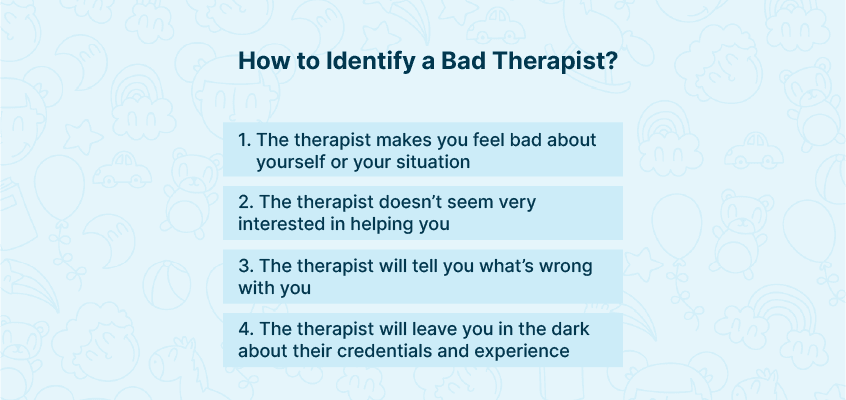Introduction
A therapist helps people explore, understand, and explain their feelings and emotions. As a result, you can make better sense of what’s happening to you and seek alternative healing options. However, it’s not always a feel-good experience with therapists. There are always some bad apples you need to watch out for, making it important to identify a good therapist from a bad therapist.
Our Wellness Programs
What Is the Role of a Therapist?
A therapist, or psychotherapist, is a licensed mental health professional who helps clients improve their cognitive and emotional abilities and reduce symptoms of mental illness. A licensed mental health professional treats their patients through different exercises and approaches.
Looking for services related to this subject? Get in touch with these experts today!!
Experts

Neelam Parwani

India
Life Coach
Experience: 5 years

Pompi Sharma

India
Life Coach
Experience: 5 years

Deepti Gandhi

India
Life Coach
Experience: 6 years

Zabby Sharma

India
Life Coach
Experience: 11 years

Ritu Singh

India
Life Coach
Experience: 16 years
How to Identify a Bad Therapist?
Bad therapists lack expertise. Therapists who aren’t great listeners are no good. If you share your feelings, thoughts, or experiences with a good therapist, they’ll just know the best way to respond. There’s more to this list. Here are some traits of a bad therapist.
The therapist makes you feel bad about yourself or your situation.
It’s essential to know that a good therapist will not compare your struggles to those of other patients, and they won’t tell you to look on the bright side when it comes to problems you’re trying to resolve. It’s difficult to stay objective, but it’s necessary to remain client-centred and not allow our biases or judgments to lead our work.
Furthermore, it is not your therapist’s job to unconditionally support your choices. That said, if you feel like your therapist is dismissive of your experiences, it’s time to find someone new.
The therapist doesn’t seem very interested in helping you.
Therapists do not necessarily need to be your best friends, but harbouring genuine dislike for each other is not a good idea. Therapy sessions can’t be productive if you spend most of them thinking about how much you dislike the person you’re talking to. The best therapists will not focus on your words all the time but on the meaning hidden behind them. The moment your therapist seems uninterested in what you’re talking about, even in a professional capacity, it’s time to find someone else.

You don’t feel like the therapist is on your team but against you and what you want to accomplish with therapy.
A therapist may get caught up in the details of the patient’s story, thus omitting the larger context or why the story is important to the patient. The therapist ignores the patient’s emotional content and instead focuses on unimportant details or details that have no relevance to the narrative. Therapists can tell a lot about the meaning of your words by observing those cues. It doesn’t matter how good a therapist is if they can’t connect with their clients.
The therapist will tell you what’s wrong with you.
If your therapist tells you what to do instead of helping you discover yourself, that is not helpful! Psychotherapists do not give advice! A therapist will help their clients become competent in thinking, acting, and solving problems independently. The benefit of seeing a therapist is clear, but that doesn’t mean those sessions will be stress-free, especially when you’re dealing with trauma. Having said that, if you dread going to your sessions to the point that they are stressful, you should look for a new therapist.
The therapist will leave you in the dark about their credentials and experience.
In some countries, therapists practice psychotherapy without any sort of license. Patients are generally unaware of this. An unlicensed therapist may lack the skills to deal with specific issues that need expertise and emotional intelligence. Hence, it’s vital to know the credentials of your therapist. If the therapist does not have credentials in the form of physical certification, it is better to find a new therapist.
The therapist will not explain why they suggested a course of action.
It’s crucial to find out what kind of model your therapist uses. People rarely ask this question when they see a therapist. Most of them are familiar with psychoanalysis and behaviour therapy, but not much else. Therapists must provide you with a document/certificate that proves that they have learned that model. It is not the same to make decisions regarding your physical health as it is to make decisions regarding your mental health. So, inquire your therapist about the models they use in their treatment model.
If the therapist only concentrates on themselves or their own goals.
The therapist may occasionally share a personal anecdote as per the client’s interest. Therapy practitioners often use themselves as tools to illustrate a point to the client or relate to them to build engagement. However, therapy is for clients, not therapists. Therapists don’t typically discuss their lives in sessions because they don’t want the session to become about them. Sessions are based on the client’s needs and experiences. Your sessions may not be as fruitful as they could be if your therapist frequently discusses their problems or personal lives instead of yours.
Their behaviour isn’t up to the mark.
Some therapists may be too pushy, while others may be too passive. A therapist who hesitates to give you advice or is apprehensive about giving you the push you need to improve your life may not be proactive enough. In addition, therapists who don’t have a plan for helping you to solve your problems will say very little during sessions. If you’re not making any progress in therapy, it may be time to find a new provider.
If the therapist does not give you proper time.
Patients should stick to their 45 or 60-minute allowance as much as possible. If you try to push the therapist’s boundaries every week, you’re probably exceeding the limits. Let your therapist know if you need a few extra minutes. A therapist who ignores their client’s needs at a time like this is not looking out for their best interests.
If you feel judged by your therapist, it’s time to move on!
A judgment that shames clients is hurtful and hinders therapy progress. Experiencing such judgment should not be an option. It is not healthy to feel judged for sensitive feelings when you are vulnerable. If this is the case, find another therapist who can accept and support you for who you are while holding the vision for where you want to be in the future.
How to find a better therapist which you deserve
Get in touch with organizations that deal with your area of concern and identify your goals. Use an online therapy app for additional information. At United We Care, we offer a range of services based on your situation and liking.
Conclusion
The experience of therapy is often rewarding, but finding the right therapist may take several tries. Lastly, don’t hesitate to fire your therapist if they are unreliable, unethical, judgmental.














